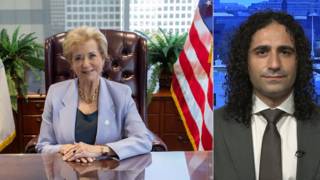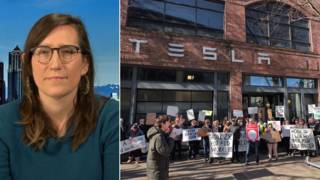HeadlinesApril 15, 2003
20,000 Converge in Nasiriyah to Protest First Talks in Iraq on Post-Invasion Government
Some 20,000 people have converged on the southern Iraqi city of Nasiriyah to protest the first talks in Iraq on a post-invasion government. The talks begin today. The U.S. is flying in representatives of exiled opposition groups to meet local tribal and religious leaders. Unlike local recruiting efforts around the country, these talks are by U.S. invitation only.
Iraq’s main Shia Muslim opposition group, the Supreme Council for the Islamic Revolution in Iraq, organized the protest against U.S. control of the talks. People chanted, “Yes to freedom! Yes to Islam! No to America! No to Saddam!” The BBC reports the Shia are concerned Washington is preparing to install a pro-U.S. puppet government.
The retired U.S. general in charge of post-invasion Iraq, Jay Garner, and President Bush’s special envoy to Iraq, Zalmay Khalilzad, will run today’s meeting. Pentagon and State Department officials will also be present. The Bush administration’s favorite Iraqi exile to lead post-invasion Iraq, Ahmed Chalabi, is expected to be a contested topic of discussion. Chalabi is insisting he is not a candidate for any post, and is sending a representative to the talks rather than attending them himself. U.S. officials have not announced why they are holding the first meeting in Nasiriyah and not the Iraqi capital. Nasiriyah is Chalabi’s hometown, and the U.S. military airlifted him there last week with hundreds of his own troops. The U.S. has granted the United Nations observer status.
Meanwhile, the U.S. ambassador to Morocco, Margaret Tutwiler, left for Baghdad yesterday. She’s been chosen to oversee all public relations and information operations in post-invasion Iraq. Tutwiler was the State Department spokesperson during the first Gulf War in 1991 under Bush Sr. She will now work for General Jay Garner.
Armed Shias Attempt to Bring Order to Baghdad Streets
In Baghdad, armed groups of Shia citizens are attempting to bring order to the streets. The Shia told the London Guardian they’re acting on instructions from clerics in the holy city of Najaf. They say they’re cooperating with U.S. authorities and have no objection to their presence in the city, provided it’s temporary. The Shia leadership in Najaf used its long-established underground communications system to distribute instructions to mosques across the country to form defense committees. A senior imam at the Buratha mosque in Baghdad said his group has managed to secure the water plants and electricity substations and all the hospitals in the neighborhood. He said the next stage is for Najaf to control what’s happening in the streets. The Guardian reports the emergence of the Shia defense committees overshadow the halting return to work of elements of Baghdad’s city policy yesterday. Uniformed police were barely visible.
Local Shiite Cleric Appoints Himself Mayor of Kut
In the southern city of Kut, a local Shiite cleric has appointed himself mayor and taken over city hall. Sayed Abbas is said to be a local leader of the Supreme Council for the Islamic Revolution in Iraq. He’s hired 300 Iranian Shiites to protect him. They rallied outside city hall yesterday, shouting, “No, no Chalabi!” The New York Times reports, in towns and villages across the south, men are stepping into the power void, uninvited by the Pentagon. In Amara, a small family with ties to the Lebanese group Hezbollah is claiming title to the town. In the city of Kumayt, three sheikhs with ties to Iran are claiming municipal authority.
The Pentagon said yesterday major combat in Iraq is now over. Two of the five aircraft carriers in the region will head home as early as this week. The announcement comes after the fall of Tikrit to U.S. forces, but Baghdad is still in a state of chaos.
Baghdad’s National Library and Archive Set Ablaze
After international outrage at the failure of U.S. troops to protect hospitals and the looting of the famous National Museum, Baghdad’s National Library and Archives went up in flames yesterday. Almost all the contents of the library are destroyed. British war correspondent Robert Fisk reports the library was a “priceless treasure of Ottoman historical documents,” including the old royal archives of Iraq. He saw pages blowing in the wind of handwritten letters between the court of Sharif Hussein of Mecca, who started the Arab revolt against the Turks for Lawrence of Arabia, and the Ottoman rulers of Baghdad. Fisk also saw the Qur’anic library burning nearby, which includes one of the oldest surviving copies of the Qur’an. He rushed to the offices of the Marines’ Civil Affairs Bureau. He gave the map location and said it would take only five minutes to drive there. Half an hour later, there wasn’t an American at the scene. Meanwhile, nine British archaeologists published a letter in the London Guardian yesterday charging that private collectors are persuading the Pentagon to relax legislation that protects Iraq’s heritage by prevention of sales abroad. The Guardian reports Pentagon officials are denying accusations that the U.S. government is succumbing to pressure from private collectors to allow plundered Iraqi treasures to be traded on the open market.
U.S. Marines Raid Palestine Hotel, Try to Keep Foreign Journalists from Covering Anti-American Protests
U.S. Marines raided the Palestine Hotel this morning. That’s where foreign journalists are staying. It’s also where the U.S. has set up a temporary operations base. Marines kicked down doors, rousing journalists from their beds, pointing M-16s in their faces, this according to the Associated Press. Marines were seen guarding suspects in a hall and interrogating a man who said he’s a cameraman.
Meanwhile, U.S. forces tried to keep the media from covering the third straight day of anti-American protests by Iraqis outside the Palestine Hotel. Hundreds of Baghdad residents gathered outside to protest the failure of the U.S. to do more to stem the looting and lawlessness. The AFP reports for the first time visibly angry U.S. military officials tried to distance the media from the protest, moving reporters and cameras about 100 feet away. A Marine colonel, who wore the name Zarcone but would not give his first name or title, said, “We want you to pull back to the back of the hotel because they are only performing because the media are here.” Much of the city is still without water and electricity. There’s still fighting going on in some parts of Baghdad.
Iraqi Civilian Death Toll Mounts as U.S. Troops Protect Ministry of Oil
There’s a picture in today’s New York Times showing an Iraqi boy who lost both his legs in a bomb strike in Baghdad yesterday. There’s no article to explain what happened.
In Saturday’s New York Times, John Burns reported that a U.S. tank gunner shelled a truck last week. He killed two brothers who ran a family tannery that sold leather goods to luxury fashion houses in Italy. The Times piece is spun as a feature about how the 22-year-old American corporal is dealing with the knowledge that he killed civilians. But the article goes on to reveal an incredible statistic: Hundreds of Iraqi civilians have been killed in similar incidents, he says. All across Baghdad and the highways leading to the Iraqi capital, there are wrecks of civilian vehicles. In many of these wrecks, the burned and bloody corpses remain for days, even a week or more. These incidents have generated a wave of bitterness and anger across Iraq.
Toward the end of the article, another issue which has been obscured by the mainstream U.S. media emerged. Abdul Malik, a cousin of the two brothers, told The New York Times that U.S. troops have made no attempt to protect any government building from looters, except the Ministry of Oil. The Agence France-Presse confirms U.S. tanks are protecting the Oil Ministry and not hospitals or museums.
Argentine Reporter Becomes 13th Journalist Killed in U.S. Invasion of Iraq
An Argentine freelance reporter died yesterday in a car crash near Baghdad. A Portuguese journalist traveling in the same vehicle said he heard gunfire before the crash. Mario Podesta worked for the America TV television channel. He had worked as a war correspondent in over 30 conflicts. He’s become the 13th journalist to be killed in the U.S. invasion of Iraq.
BBC: U.S. Has No Plans to Remove Depleted Uranium Debris
The BBC is reporting the U.S. says it has no plans to remove the debris left over from depleted uranium weapons it’s using in Iraq. It says no cleanup is needed because research shows DU has no long-term effects. Many dispute this claim.
Aid Workers in Kuwait and Jordan Prevented from Entering Baghdad
The London Telegraph is reporting hundreds of aid workers in Kuwait and Jordan have been waiting for three weeks to get into Baghdad and other Iraqi cities but are prevented by the lawlessness there.
Anti-Syria Rhetoric of U.S. Officials Criticized by International Community
Secretary of State General Colin Powell accused Syria of harboring officials from Saddam Hussein’s government and threatened economic or diplomatic sanctions. White House spokesperson Ari Fleischer called Syria a “terrorist state” and a “rogue nation.” Donald Rumsfeld claims Syria has carried out chemical weapons tests in the last year. Israeli Prime Minister Ariel Sharon jumped on the opportunity and called Syrian President Bashar al-Assad dangerous. He urged Washington to put “very heavy political and economic pressure” on Syria.
Arab countries, Russia and the European Union have criticized U.S. rhetoric. Arab League Secretary-General Amr Moussa said he was astounded by the threats. An adviser to Egyptian President Hosni Mubarak warned the Americans against the temptation to target one Arab country after another. Earlier, Russia and the European Union urged the United States to show restraint. U.N. Secretary-General Kofi Annan warned that statements directed at Syria could destabilize the whole Middle East. British Prime Minister Tony Blair tried to reassure his Parliament and pledged there are no plans to invade Syria. And the Syrian Foreign Ministry spokesperson, Bouthaina Shaaban, said, “The only country in the region which has chemical, biological and nuclear weapons is Israel.” The Washington Post reports senior administration officials claim there are no plans to invade Syria.
Creative Associates International Awarded USAID Contract to Improve Education in Iraq
Washington-based firm Creative Associates International, Inc. has won a $60 million contract from the U.S. Agency for International Development to improve primary and secondary education in Iraq. Before the 1991 war, the Iraqi education system was considered among the best in the Arab world. But that conflict and subsequent U.N. sanctions have caused a significant decline, according to the United Nations.
Treasury Fines Multinational Corporations for Busting U.S. Trade Sanctions
The Treasury Department has fined several multinational corporations for busting U.S. trade sanctions. The companies include ChevronTexaco, ExxonMobil, Caterpillar, Citibank and Walmart. The Treasury is not releasing the details of who the companies traded with or the reason for the size of the fine. Corporate Crime Reporter and the advocacy group Public Citizen have sued the Treasury under the Freedom of Information Act to release the information.
Most popular
- 1
- 2
- 3
- 4
Non-commercial news needs your support
Please do your part today.











Media Options